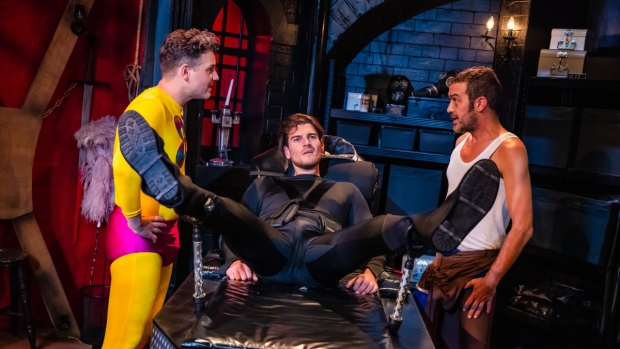”Horse-Play” at Riverside Studios – review

© Danny Kaan
The great British sex farce is back! Gosh, who missed it?! No Sex Please, We’re British managed over 6,700 West End performances through the 1970s and 1980s, Run For Your Wife achieved a run of nine years between various venues in the 80s, and Not Now, Darling had them rolling in the aisles of the Savoy for several years. It was a peculiarly British phenomenon that never travelled well: sexual repression married to light-hearted misanthropy, it wasn’t successful abroad (the Broadway version of No Sex ran 16 performances), and it’s a theatrical genre one didn’t expect to see again. But no, here comes Ian Hallard’s racy 21st century take, and, this being 2022, a modern equivalent is perhaps inevitably gay, with a capital G, a lot more explicit, but ultimately just as essentially harmless and unsexy.
But because it’s gay, it’s automatically hilarious and edgy, yes? Actually, no: devoid of wit and insight but heavy on ham-fisted exposition and relentless innuendo, when it’s not just flat-out crude, Horse-Play is less a joyfully naughty comedy and more an endurance test for audience and actors alike. Set in a sex dungeon where husbands Tim and Tom (their names are actually one of the jokes in the script, which gives you some idea of the level of humour here) are treating themselves to a night of superhero cosplay with hunky Karl which goes wrong when Karl trips over and passes out, leaving Tim (or is it Tom?) tied to a table and Tom (or possibly Tim, if anybody even cares at this point) locked in a cage. What follows is a crude, mirthless game of ‘will-they-won’t-they’ where the husbands bicker and moan, and where nothing that comes out of anybody’s mouth sounds remotely plausible.
If you ever hoped to see someone wet themselves onstage, or a bunch of characters use different varieties of lube, as opposed to water, to orally rehydrate, then Horse-Play is your show. If, however, you like your humour character-driven with a lightly borne comprehension of the human condition and the understanding of the close proximity of comedy to tragedy then yeah…this isn’t for you. There’s no character development whatsoever, just loads of brain-fatigued talk and flat-as-a-pancake comedy shtick. Crucially, it’s just not very funny.
One might have hoped that at least Hallard would have spared us the casual racism and misogyny inherent in this brand of comedy’s antecedents but alas not…we get a (mercifully brief) appearance from a barely coherent Eastern European cleaner and the only remotely solid female character is a hard-as-nails sex worker with a mouth like a sewer and zero inner life. Stephanie Siadatan does spirited work with the paltriness of what she’s been given.
It’s an indication of the sloppiness of Andrew Beckett’s production that the oft-repeated punching in of a security passcode that would free the characters (and us) from this sex dungeon, is clearly visible from the audience, and – at least from where I was sitting – entered completely differently each time. That might be more forgivable if the actual passcode wasn’t actually spoken out loud later in the script. To be honest though, that’s the least of this show’s problems.
In a generally dire piece of theatre, the sole redeeming feature is David Ames, who’s genuinely engaging as one of the husbands, a sassy guy with an impressively comprehensive working knowledge of mid 80s American soap operas. It’s cute but it’s not enough. For the second time this year (the first being Steve which opened Seven Dials Playhouse and, while far from brilliant, looks like Private Lives compared with this farrago), Ames tethers a natural comic flair and lovely stage presence to a sub-standard script. I can’t wait to see him in something more deserving of his talent.
Heartless, soul-suckingly tedious (who knew extreme sexual behaviour could be this dull?!) and desperately unfunny, Horse-Play neither shocks nor delights. It feels mean-spirited and puerile…and it’s hard to imagine who this is actually aimed at. Ghastly.










